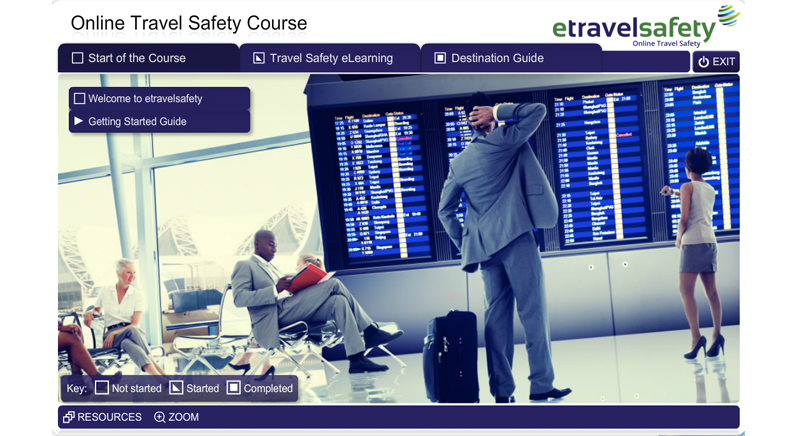Travel security – protecting travellers in an uncertain world
Tim Compston, features editor of SecurityNewsDesk, discovers what organisations can do to help keep their staff and travelling customers out of harm’s way.
In an uncertain world where lone wolf and marauding terrorist attacks are hitting the headlines – with the events in Paris, Mali and Tunisia bringing the ongoing threat into sharp relief – travellers may be faced with the security situation in the country they are visiting changing for the worse, pretty much overnight.
A new analysis issued by Collinson Group makes for interesting reading in terms of a marked growth in UK business travellers jetting off to more dangerous locales. Looking at Travelpac data, from the ONS (Office of National Statistics), Collinson Group headlines a 52 percent increase in the number of visits to high-risk destinations in the first half of 2015, compared to the same period a year earlier. High-risk countries which have experienced level three security incidents – from coups to terrorist attacks – as identified by Collinson Group – include: Nigeria, Tunisia, Pakistan, Ukraine, Turkey, Egypt and India.
New threatsRupert Reid, director of security and crisis management at Collinson Group – whose 360 Assistance solution provides access to a portal for global security alerts – takes-up the story on how the threat landscape has evolved for travellers: “With the very recent trends in terrorism we are talking less about kidnapping and now more general political violence, radicalisation, and the fundamentalist threat.”
He goes on to say that before when people were going abroad they used to open a map and go ‘oh the red country I should avoid that’ whereas now the message from Reid is that they really need to look at almost any territory they are going to and concentrate more on what the risk might be there: “It has really broadened out for all of us.”

Pressing Reid about what can be done in response to these changing times, his view is that it boils down to communication rather than simply the process: “The shift should be to rely less on technical and written down procedures and more on flexible communication. The reason that I say this is if you look at the Paris situation you have to ask what company procedures would have completely avoided it. When something like that happens what is really important is that the people affected can communicate quickly with someone who knows what they are talking about to advise them on what they need to do – that’s the contingent response aspect of it.”
In the aftermath of an attack like Paris, Reid explains that there were broadly two categories of people, those directly affected – at the focus of the incident – and the vast majority on the periphery: “These are the people whose calls we fielded, who were traumatised by Paris, people who were hiding under hotel beds because they had been told by the hotel to stay there but they had no other source of information. So it is confusion and trauma. What do you do? Do you abide by the hotel’s rules when they give the all-clear? Is it really all clear?”
Reporting resilienceHeading to the other side of the Atlantic it would seem that, in spite of terrorism, business travel is pretty resilient. A poll conducted by the Global Business Travel Association (GBTA) found in the days following Paris that travel plans to Europe by nearly three-quarters of U.S. business travel buyers remained largely unaffected, despite the seriousness of what happened in the French capital. Looking at the headline figures in more detail, a majority – 57 percent – reported ‘no change’, a further 16 percent only ‘slight reductions’ in their company’s travel to Europe, and, crucially, only a tenth of those surveyed confirmed that they had temporarily suspended travel to Paris.
Talking to Charlie Burbridge, managing director of Risk Consulting and International Accounts at G4S, for his take on business traveller safety and security, he confirms a steady increase over the last year of interest in the provision of travel risk management.” Expanding on this theme he says that there are a number of interlinked component parts: “One is an understanding of the threat, which is the provision of intelligence – analysed information, and then a capability that the customer, in the event of an emergency, can get in touch with a provider who is able to react and also an ability to understand where their staff are at all times.”

Burbridge is keen to emphasise the ‘duty of care’ which businesses have to their employees and the wider reputational impact should the worst happen: “If an employee of a high profile FTSE 100 company decides to go off-piste slightly and travel to a town which the company is not particularly happy for them to do, the ability to understand where that employee is on business time is very important. The implications of that person being kidnapped or killed could impact on that company’s reputation, their future recruitment and talent retention, because the view is that they weren’t able to safeguard their staff.”
Regarding new developments which are taking-off for travel risk management, Burbridge singles out the ability to deliver a technology platform that assures people either before they go – in the case of intelligence – or when conducting their business, as exemplified by the G4S TravelAware app, launched back in September.
Looking at the TravelAware solution in more detail, it provides travellers with location-specific security information through a smartphone app, while managers have access to precise tracking of app users in real-time. Through an online portal and via the app, TravelAware enables two-way communication, keeping employees and managers connected and informed at all times.


Another enthusiastic advocate of new thinking here is Stuart Anderson, ceo of eTravelSafety.com who reckons that, given the number of employees regularly travelling overseas on business, a travel safety eLearning platform makes more sense logistically and budget-wise: “Traditionally training took place face-to-face so it was in a classroom. I have delivered this in many countries around the world, it is very effective training, but this limits it to large corporations who can afford the outlay and rules out small companies and scalability as there are only a finite number of people with the skills to deliver such training.” Package tour security
Broadening things out to the issues facing travel firms looking after their holidaymakers, Lee Doddridge, director at security consultancy Covenant, reflects on his involvement advising a major package travel company: “The first projects were out in Egypt, Sharm el-Sheikh and Luxor. They came at it from a really good angle. What they didn’t want to do was to tell the hotels and their staff about the security review. They did it more along the lines of a ‘mystery shopper’ exercise. They identified the hotels and we would spend three days in one, two days in another, as if we were tourists. We could make good assessments from ‘a tourist’ perspective and see how things operated on a day-to-day basis, what the guard provision was, what was mentioned in the reps welcome briefing, and access the security for excursions from the collection at the hotel to the bus journey and the excursion itself.” Better prepared
So to conclude, although to some extent the dangers faced by business travellers may have risen on the terrorism front the good news is that the resources which employers and employees can tap into, to keep abreast of developments on the ground, have never been greater.
[su_button url=”https://www.securitynewsdesk.com/newspaper/” target=”blank” background=”#df2027″ color=”#ffffff” size=”10″ radius=”0″ icon=”icon: arrow-circle-right”] To read more stories like this click here for the SecurityNewsDesk Newspaper [/su_button]












